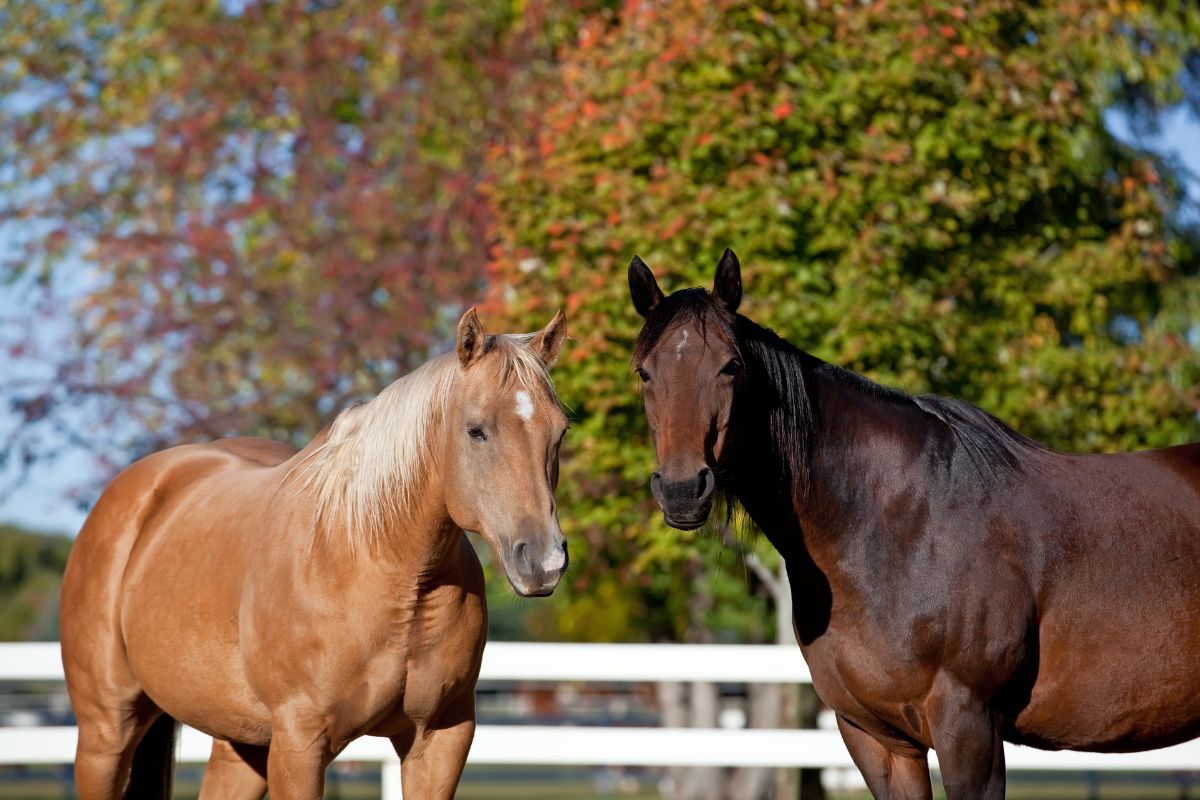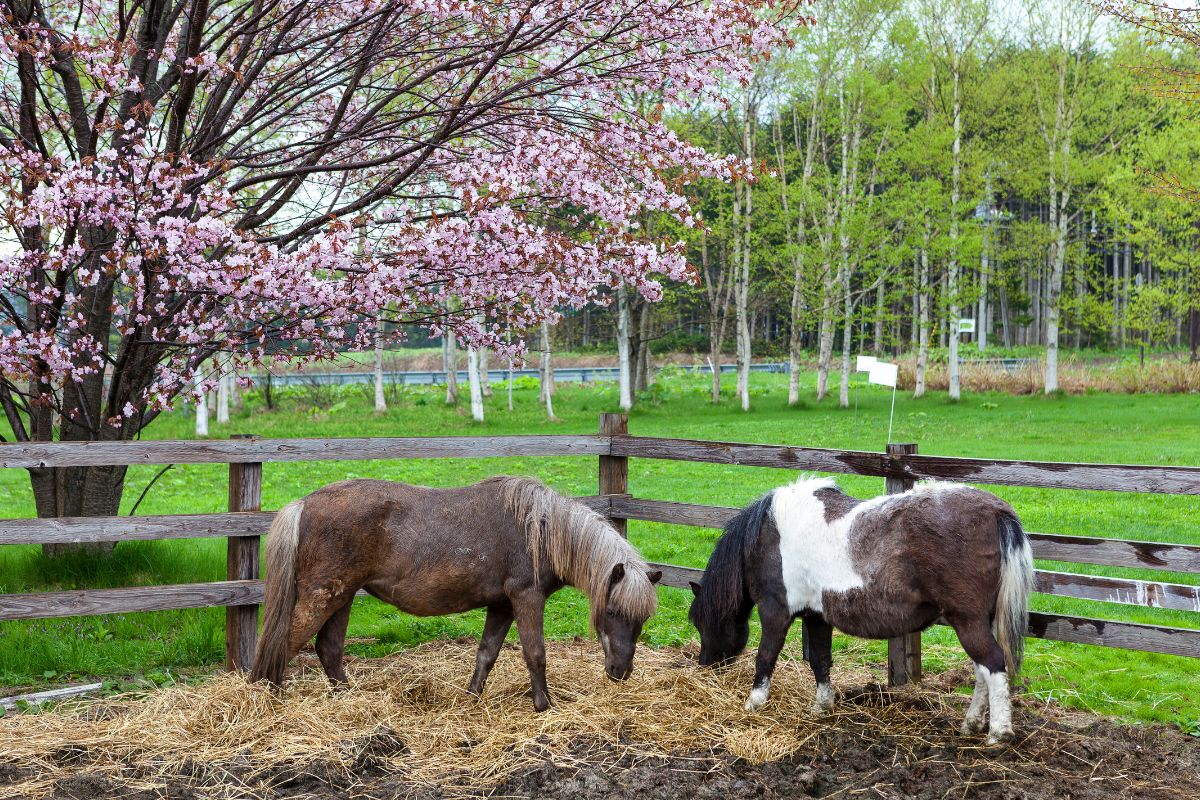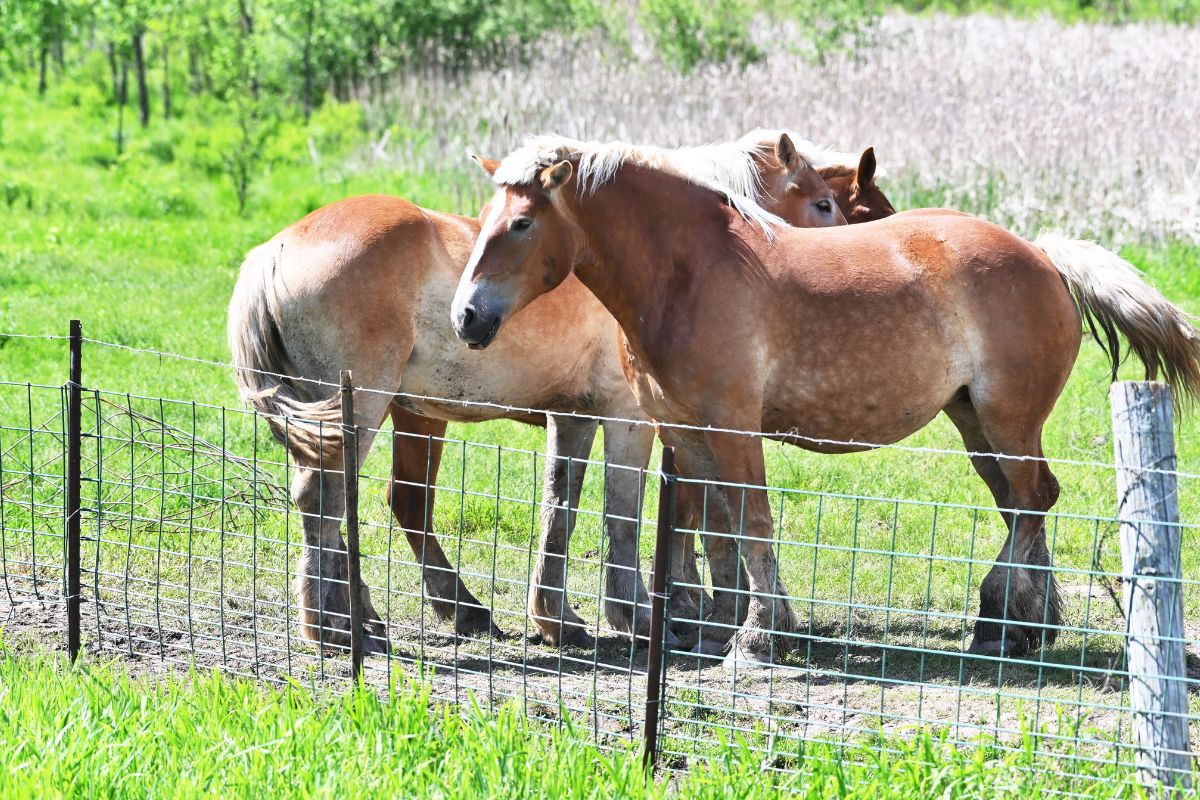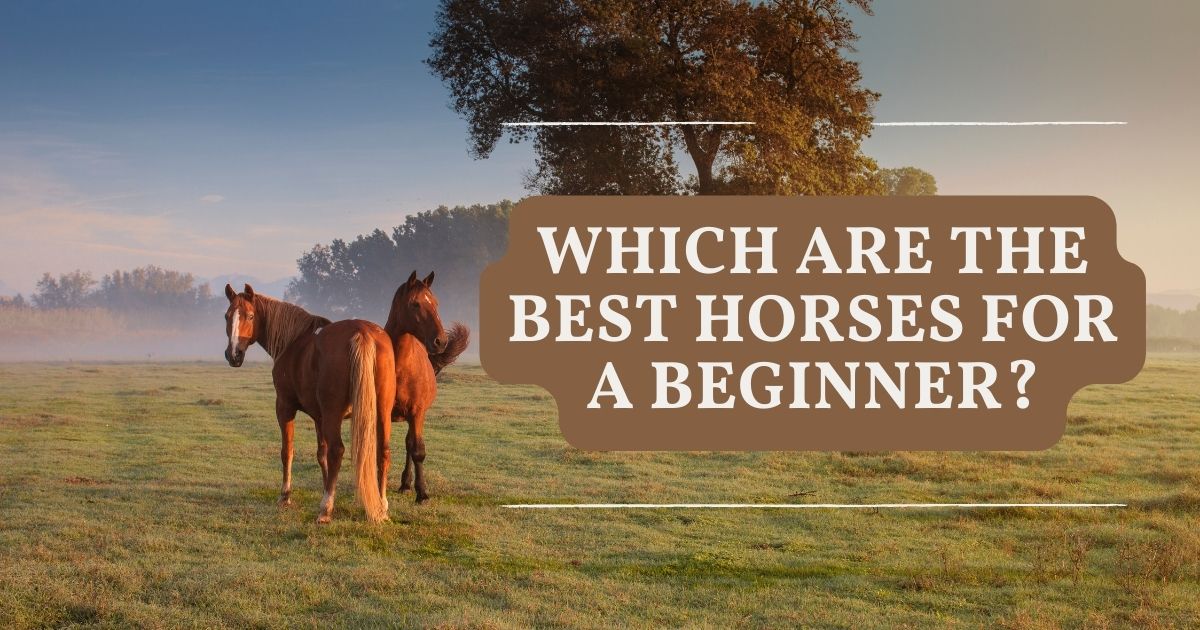Equines and Beginner Riders
It is important to Know what qualities to look for and what to avoid when selecting the best horse for a beginner. Quarter horses are the ideal horse breed for new riders. But when picking a horse for a beginner, the breed isn’t the most important consideration.
The secret is to choose a mature, well-mannered, even-tempered, well-trained horse that doesn’t spook easily. Your top priority is safety.

What are the Best Horses for a Beginner Rider?
No horse breed is ideal for new riders or owners, but some types have characteristics that make them more acceptable. Safety should always be your top priority. The horse’s temperament and level of expertise should be more important considerations when selecting a beginner’s mount than pedigree.
Breeds like Morgans and American Paint horses typically exhibit attentiveness and are simpler to train—important qualities ideal for beginning riders. The following are the best breeds of horses for beginners.
American Quarter Horse
This is among the best horses for beginners. Existing in the West made the Quarter Horse a strong contender. Wherever you go in this state, a Quarter Horse is never more than a short distance away. There are just five million registered.
Most people who ride this breed do so in the western style, and Quarter Horses and cattle, in particular, go hand in the hoof. But this adaptable breed is capable of much more than working a cow.
American Paint Horse
American Paint Horses are the most striking horses you’ll see at English and (especially) Western competitions. It is one of the best beginner horses. The most recognizable trait and source of the breed’s name are its vivid “painted” coats.
This breed is ideal for new owners who want a horse with the beauty of a strikingly patterned coat and the power and endurance of a Western Stock Horse.
Morgan Horse
Thinking about the breed’s heritage and adaptability for the blog makes you yearn for the possibility of getting a second horse—perhaps a stunning Morgan! It’s understandable why this “America first breed” has become adored worldwide. Morgans are an elegant and stylish package that combines athleticism, style, and adaptability.
Tennessee Walking Horse
Consider a Tennessee Walking Horse if you enjoy a tall glass of sweet tea from the South. In the beginning, plantation workers who wanted to travel a lot of distance each day without developing saddle sores developed this “gaited” breed.
Their distinctive “running walk” gait, which consists of four beats, is so fluid that you can ride along while holding a glass of wine without spilling a drop.
Appaloosa
The Appaloosa is one of the most instantly recognizable breeds. Even now, people on the street still pause and pause to marvel at their iconic spotted coats.
We owe this amazing breed to the Nez Perce tribe, which originated it, and to the devoted community of breeders and fans, ensuring its continued viability today. If you prefer to make an impression, you might enjoy owning an Appaloosa.
Arabian Horse
The Arabian is one of the most graceful and dramatic breeds. These horses are unmistakable in appearance and personality; they command attention everywhere they go. Their illustrious past began in the arid deserts of the Arabian Peninsula, where survival necessitated exceptional lung capacity, toughness, and endurance.
Today, both pleasure riders and competitors throughout the world adore this breed. The Arabian may provide first-time owners with a joyful, adventurous, and safe companion for whatever adventures life has in store for you two. It is adaptable enough for practically every discipline and interesting enough to learn any work.
Mustang
Most Mustang admirers concur that these savage offspring of Spanish colonial horses (with numerous other breed influences) belong in the wild. But the modern world has other ideas. Control of population is part of the Wild-Free Roaming Horses and Burros Act (1971), supervised by the Bureau of Land Management (BLM).
The outcome? According to BLM data, between 4,000 and 8,000 wild horses and burros leave public lands each year, get held in facilities, and then made available for adoption to the general public through online and live auctions. Here is where you step in.
Icelandic Horse
One of the most identifiable breeds, the Icelandic Horse, garners more “Awww!”s than most other breeds combined. It makes sense, given their sturdy small bodies, fluffy manes and tails (and let’s not even talk about their forelocks), and kind eyes.
The breed, descended from the ponies of Norse settlers, is still carefully watched over and nurtured in Iceland. You cannot import Icelandic Horses and the horses exported before cannot return to preserve the “purity” of the breed.
Norwegian Fjord
You can identify the Norwegian Fjord, a “low draft” breed, by its distinctive hue, dorsal stripe, and roached black and brown mane. It is among the best beginner horse breeds. According to the Norwegian Fjord Horse Registry, one of the world’s oldest and purest breeds. The Fjord, which has been under careful nurturing for 2,000 years, is history personified.
These adored little horses have it all—strength, sweetness, and calmness. You’ll witness them handling trail hazards, pulling carts, stopping at x on the dressage arena, and much more.
Thoroughbred
This is one of the best beginner horse breeds. Most people imagine sleek speed machines speeding around a racetrack when they think about Thoroughbreds.
Although many horses still pursue racing careers, most Thoroughbreds have never trotted on a track (and don’t want to). The reputation of modern Thoroughbreds as elite competitors and all-star athletes has been growing.
Like Arabians, this breed is best for competitive individuals with an adrenaline addiction. Nevertheless, every rule has an exception. Some thoroughbreds are willing to amble down the trail or stroll around the lesson ring.
Connemara Pony
A fantastic candidate category that first-time horse buyers frequently overlook is ponies! This is one of the friendliest horse breeds. Ponies become some of the best friends of new owners. Because of its sturdy height, athleticism, compassion, and adaptability, the Connemara Pony is particularly well suited to beginners. But let’s face it, they are quite adorable.
Ireland gave birth to the Connemara Pony, which has since gained popularity across the globe in the show ring, training arena, and backyard. Adults and kids can enjoy this breed on the flat, over fences, and on the trail. Who wouldn’t want a little Irish luck, too?

Which Horse Breeds are NOT Suited to Novice Riders?
New riders should generally avoid untrained and spirited horses because they can be challenging for even seasoned riders. One breed that can be too extroverted for someone with little equestrian expertise is the Akhal-Teke.
The athleticism of Andalusian horses can often make them difficult for beginners to handle. As with other breeds, there are exceptions, depending on the horse; their age, experience, training, and disposition are the most important factors.
How do I Pick my First Horse?
Don’t pick a horse for a beginner based on the breed. Horses are unique creatures that you should judge according to their own merits. Breed-specific traits are abstractions. Find a horse that fits your needs, and consider the temperament and fitness of the animal. You are purchasing a horse, not a specific type.
Nevertheless, you may exclude some breeds depending on the activity you intend to partake in.
For instance, certain draft breeds make poor jumping, dressage, or barrel racing horses. Horses of the same breed share traits such as temperaments, gaits, and physical qualities; nevertheless, because horses are unique, they do not conform to the breed model.
Although Thoroughbreds and Arabians are frequently high-strung, several were among the sweetest and most gentle horses you’d ever meet. A horse’s nature gets influence from its lineage just as much as its breed. Even if each horse is unique, looking at several popular breeds is worthwhile to see whether their typical traits would be good for a novice.
Get Some Horse Experience
Spend time riding and training horses before purchasing to ensure you aren’t squandering your money. You can also get a horse you prefer from this. While some people appreciate riding towering horses, others enjoy riding tiny horses. It’s important to experience horses before you buy. There are a few alternatives to buying a horse to gain experience:
- Spend one day each week at a riding facility learning to ride under the guidance of a knowledgeable instructor.
- Rent or loan out a horse. You might agree with a horse owner to keep and take care of their horse for a particular time. Or perhaps a friend of yours will let you control their horse for a few weeks.
When someone gets exposed to horses, they gain some understanding of the expenses involved in owning a horse. Fees for the veterinarian, shoeing, tack, and feed all mount up. Acquiring a horse is a major commitment, so consider it carefully.
Temperament
The most crucial element for a novice rider is temperament. Temperament is the horse’s general behavior and disposition, both on the ground and while saddled.
When choosing your first horse, temperament is the most important consideration if you decide to purchase. The ideal horse should never kick or bite and should be kind, gentle, quiet, and peaceful. But there are also other things to think about.
Equine Activity
You should match your horse to your horse activity. Before purchasing, it is critical to consider how you plan to use your horse. Some breeds and temperaments are best for certain activities than others.
If you intended to participate in barrel racing, you wouldn’t waste time researching massive draft breeds of animals. And if you are a beginner, you wouldn’t want to get a competitive barrel horse.
Riding Ability
You should suit your horse to your level of riding. Choosing a horse based on your skill level is essential if you want the most enjoyment from owning one. For instance, purchasing a competitive quarterhorse wouldn’t be a good idea if you wish to start barrel racing but are a novice rider.
Most inexperienced riders will fall to the ground when top-level barrel horses accelerate out of turn. To begin with, it might be preferable to an older, slower horse who is familiar with the pattern but won’t abandon you when turning a barrel.
Although it requires honesty, admitting your riding abilities will make you safer and have a better time overall. You want a horse trained for the activity you intend to do, one that is mature. When trying to learn anything new for yourself, you don’t want to have to teach a horse.
What to do Before a Horse
Before you begin looking at beginner horses for sale, follow these rules.
Ride the Horse
Never purchase a horse unless you ride it before. It’s okay to browse the internet for horse photographs, but that’s not how you buy a horse. Some people in the horse industry use the internet to sell unwanted horses. You must tack the horse and don’t want to possess a horse you can’t saddle or bridle.
To make sure the horse is the appropriate fit for you, the vendor should ideally allow you to test it out for a week. Write down your agreement if he permits you to take the horse.
Have an Experienced Person Check the Horse
If you aren’t friends with any, pay someone, and ask them to check out the horse for you once you’ve discovered one you’re serious about purchasing. A person familiar with horses can spot confirmation flaws and other issues that a novice eye would miss.
Additionally, they can observe you ride and serve as a defense against a cunning horse merchant. The inspection can ultimately save you from making a costly error.
Vet-Check the Horse Before Buying
You don’t want an old horse that needs ongoing medical attention to stay alive; you want a mature, seasoned horse. A standard battery of exams that veterinarians do to verify fitness is a vet check.
A vet exam can prevent high future costs. Depending on how thoroughly you want the horse inspected and what you want to do with the horse, there are different degrees of vet checks.
Use a knowledgeable horse veterinarian you are familiar with or who comes highly recommended by someone you respect.
You should examine any horse you purchase, regardless of price or value; a horse that appears healthy could nevertheless have a serious health issue.
Find a Lot of Information About the Horse
Get the name of any veterinarian who has treated the horse and requests their records. If the horse has participated in competitions, ask around to find out how it did.
You shouldn’t rely on the merchant to give truthful information. Many people sell their horses to uninformed buyers. Move on if you cannot learn more about the horses’ past. Without pressing the matter, you will discover the ideal equine.
Do Some Research on the Seller’s History
Ask people about the merchant if you don’t know him personally. Gain as much knowledge as you can. Someone may be able to provide you with information about him if he has been in the horse business for a while.
As an illustration, a horse trader had a reputation for doping his horses before exhibitions. Only purchasers outside the area could purchase his horses due to his poor local reputation. Don’t purchase the horse if you can’t confirm the seller is an honest individual.
When looking for a horse, horse rescue organizations are a great source of information. They have employees who care for and train the horses and know how to match them with potential owners with different riding skills.
When Purchasing a Horse, Obtain a Bill of Sale
Get a bill of sale; you can find a straightforward example online. Ensure it has the horse’s distinguishing markings, registration number, seller’s name and address, and warranty details.
Ensure that the seller signs the contract.
Always Ask a Lot of Questions When Buying a Horse
You must answer a few crucial questions to pick the perfect horse for a novice. You can assign a value to the horse or rule it out based on the answers to these questions. Some fundamental inquiries are as follows:
- Is the equine legally owned? In that case, request a copy of the horse’s paperwork. The registration will determine the horse’s age, pedigree, and ownership background.
- What is the history of the horse’s health? What is the name of the clinic or veterinarian who treated the horse? Whom does he hire to shoe the horse, and what is his name?
- How long has he owned it, and what training has the animal received?
- Does the horse crib, set back, or kick specifically? Does the horse have any vices?
- Why is the owner selling the horse?
- Can you load the horse into a trailer?
- Has the horse competed? If so, in what field, at what time, and where. Is it a horse’s show record?
- Has the horse recently undergone a Coggins test?
Don’t shop for color; instead, take your time, ask questions, and if a seller appears evasive, keep in mind that other horses are always available.
Which Horse Breed is the Calmest?
The draft breeds—Belgiums, Clydesdales, and Shires—are the calmest kind of horses. However, warmblood breeds like the Irish Sport Horse are the gentlest horse breed for novice riders. Since each horse is unique, you can find calm horses in practically any breed.

Which Horse Breed is the Most Aggressive?
The most aggressive horse breeds are those with hot blood. Akhal Tekes, Arabians, and Thoroughbreds are examples of hot-blooded breeds. When their rider experiences stressful emotions or other stimuli surrounding them, such as another animal nearby, these high-strung critters might get stubborn and act out, which may result in harm.
However, depending on their training and bloodline, they can be gentle, which is why so many people adore them. Before selecting whether to purchase a horse for a novice rider, it’s crucial to understand which breeds are inherently more aggressive than others.
Key Takeaways
You are close to realizing your goal of riding horses, and I know you are eager to do so. However, remember that choosing a horse shouldn’t be an emotional decision. Instead, when selecting from the best beginners horse list, remember that you should opt for a well-mannered and trained horse, as per the advice in this post.
A mature, well-behaved horse is the greatest choice for a beginner rider; don’t worry too much about the horse’s breed or color.
